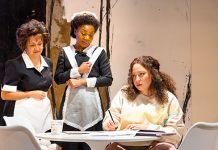By Gretchen C. Van Benthuysen |
Daniel J. Tomasulo, Ph.D., is a psychologist, professor, speaker and author, in that order. And none of it was planned. Not one thing in his incredibly successful professional life was on a to-do list.
The son of an Italian electrician father and Irish homemaker mother, he was raised in northern New Jersey with a younger sister. The expectation was he would grow up to work with his hands.
There was no indication he would become an international speaker, teacher and practitioner of a relatively new form of therapy known as applied positive psychology. It focuses on a person’s well-being and finding practices to bring more joy to their life rather than addressing only the negative.
Even though he liked to write – at age 6 he would churn out a page of “news” with a cartoon and distribute it daily to neighbors – he said he had “no real talent.”
Yet, on May 1, his fifth book, “American Snake Pit,” will be released. The collection of stories is about Tomasulo’s experiences relocating severely intellectually disabled patients from the notorious Willowbrook State School on Staten Island, shut down in 1987 for overcrowding, questionable medical practices and experiments on patients.
But don’t get the idea this memoir is a downer. “Jesus of Asbury Park” (one of 28 stories in the anthology) is laugh-out-loud funny.
Nowadays, Tomasulo also writes a monthly column for The Two River Times’ Health & Wellness section.
During a recent interview in his cozy office at The Courts of Red Bank on Maple Avenue, where he sees private patients, he talked about his various accidental careers and how so many times he just happened to be in the right place at the right time.
His father’s attempt to get him into the plumbing union via an aptitude test failed: “It came back and said, ‘Don’t let this man even flush a toilet,’ ” he said with a laugh (he does that often).
He attended Springfield College in Massachusetts, thanks to a partial wrestling scholarship. But he realized he wasn’t a great wrestler, so he got serious about studying and discovered psychology was the only thing he was good at.
“For some reason, I just knew that material,” he said. “I could chew through the books and apply the principles.”
He earned a Bachelor of Science degree in psychology in 1973. He went on to get a Master of Arts in developmental psychology from Fairleigh Dickinson University, Teaneck in 1975; a doctorate in developmental psychology from Yeshiva University, New York City in 1981 – where he was the first non-Jewish person to attend – and a Master of Applied Positive Psychology from the University of Pennsylvania in 2012.
At Fairleigh Dickinson, Tomasulo got a job in the mailroom.
“All the psych professors got their medical journals a day late,” he said. “I got to read them for free that night and put them in their boxes the next day.”
In one of the journals he saw a job ad for an evaluation counselor for The ARC of Bergen County that included tuition reimbursement.
“I got the job and ended up having a career that I never thought I’d have,” he said. “Once I realized what I was good at, it was exciting, dynamic and interesting for me.
“I really had a sense for people and their struggles, their pain and their needs, and somehow I wanted to learn how to tap into that,” he said.
He screened clients with intellectual disabilities who lived at home with parents or guardians to test their skills for jobs.
“But then I thought, ‘What’s being done for these folks who mostly lived in institutions?’ I found out nobody was doing anything. No one was doing research.”
He conducted studies, wrote papers showing people with concomitant disorders could do much more. He rejected studies that said people with developmental disorders could not participate in nor benefit from group therapy or psychodrama.
“For one year we videotaped every single group that we ran and we ran dozens of groups,” Tomasulo said. “What we saw were people transformed during that time.”
In 1980 Tomasulo took a “temporary” job teaching at Brookdale Community College in Lincroft that lasted for 21 years. He finished his dissertation, got a job running a group home for YAI/National Institute for People with Disabilities and consulted with the ARC of Monmouth.
He also contacted the American Psychological Organization about his findings and videos and was invited to present them at an annual national conference.
“Much to our amazing surprise, everyone loved it,” he said. “It was a big deal for its time because it’s extremely low cost, unbelievably effective, and did two simple things: kept people out of the hospital, which was so expensive, and kept people out of jail.
“And if it did that, somehow these people could be integrated into the community, which was a very unusual concept at the time.”
Through that work he was asked to create the community-based, group home for some of the lowest functioning people at Willowbrook, on which his new book is based. It’s also a story of personal growth.
“I always still really wanted to write, but writing academic stuff really kills your creativity,” he said.
But he might not have done it if he hadn’t been selected to participate in a year-long teaching fellowship under social psychologist John Darley at Princeton University from 1998–99.
“You can take any course you wanted for free and the teaching choices included Joyce Carol Oates, Toni Morrison, Paul Muldoon, Jack Klaff … just reading the mailboxes was great,” he said. “I studied with (playwright) Christopher Durang and he wrote me an awesome letter of recommendation for New School that said, ‘He’s harmless. Let him in.’ ”
Tomasulo earned a Master of Fine Arts/Non-Fiction Writing degree from The New School, New York, in 2001. He also was the school’s Chapbook winner in nonfiction, an award that earned him a book contract.
And an author was “accidentally” born.
So, too, was the applied positive psychologist.
Joel Morgovsky, a retired Brookdale psychology professor, is also Tomasulo’s best friend. When Morgovsky hired him in the ‘70s, a master’s degree was a lot of education, he said.
“Dan was a natural teacher, a wonderful teacher, and students flocked to him,” Morgovsky said.
But around 2010, Morgovsky noticed his friend was having a tough emotional time. So he dragged him to an international conference in Philadelphia hosted by the University of Pennsylvania and the new International Positive Psychology Association.
“I didn’t want any part of it,” Tomasulo said. “I was feeling crummy, so why would I want to spend time with 2,000 positive psychologists?”
He changed his mind.
“It was amazing. It was almost like a religious conversion,” he said. “To make a long story longer, I decided to go back to school.”
He was, by far, the oldest student in the UPenn program run by Martin Seligman, Ph.D.
“You’re not a normal psychologist,” he said Seligman told him. “You’re trained as a writer. You understand psychology, but you’re creative, you’re doing psychodrama, which includes the arts, and we want that.”
Tomasulo now travels the world teaching his applied positive psychology. Students fly to Philadelphia monthly from China, Japan, India, Australia, Scotland, Ireland and elsewhere to study with him from early Friday through late Sunday.
“This is new, it’s radical, but the research is there,” Tomasulo said. “It may be best clinical program on the planet.” So does this make Tomasulo kind of like the next Sigmund Freud?
Morgovsky won’t go quite that far.
“Let’s just say that he is an extraordinary person. He’s driven and he does so much,” his friend says. “I see he’s at the top of his game and still rising.”
This article was first published on the Scene Page in the Feb. 22-March 1, 2018 print edition of The Two River Times.














